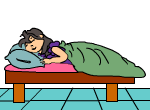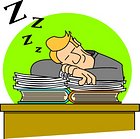|
Overcoming sleep disorders and insomnia is possible...
How can I get a good night's sleep for a change? If only I can get to sleep, or not wake up early in the morning, lying awake for the rest of the night... If only I can be more alert during the day, and not be so irritated and edgy... My relationships are suffering, my social life has come to a standstill! If these are your cries, don't feel alone, if it's any consolation. It is estimated that millions of people worldwide suffer from some kind of sleeping disorder or insomnia. Is there any hope besides taken a sleeping tablet? There certainly is, of that you can be sure. The trick is to find the right solution for YOU! There is no one-fits-all solution for sleeping disorders, but by trial and error, using some "tricks", you can find what it is that your body needs. Your body is actually trying to tell you something, and if you listen to it carefully, you WILL find the answer. Sleep, along with diet and exercise, are the cornerstones of your physical well-being. When sleeping, the cells of the body repair themselves and get rid of harmful waste. Did you know that lack of sleep and sleeping disorders can raise the risk of heart disease and diabetes to an alarming level?
How much sleep is necessary? It will vary greatly for each individual. Some guidelines: (the number of hours may include naps during the day) * Infants: about 16 hours per day * Babies and toddlers from 6 months to 3 years: between 10 and 14 hours per day. * Ages 3 to 6: between 10 and 12 hours * Ages 6 to 9: about 10 hours * Ages 9 to 12: about 9 hours * Teenagers: about 9 hours * For most adults, 7 to 8 hours a night * Older adults are also thought to need 7-8 hours * During pregnancy, women may need a few more hours of sleep per night, or find that they need small catnaps during the day.
With regard to brain wave patterns, let's look at what happens when you fall asleep: * Beta to Alpha – Your brain waves become slower and you begin to relax. * Alpha to Theta – You are in a very light sleep and can be easily woken. * Theta to Delta – You are in a deep sleep and your body is recharging itself. During the day, our main brain wave pattern is a high-frequency beta pattern. When we fall asleep, our brain wave patterns slow from beta into alpha (pre-sleep drowsiness), and then into a 90 minute back-and-forth cycle from what is called REM (rapid-eye-movement) sleep followed by non-REM sleep. REM sleep happens in a theta brain wave pattern, while non-REM sleep happens in the slower delta pattern. And...if your brain cannot make the change from beta to alpha to theta to delta... YOU'RE NOT GOING TO FALL ASLEEP!
OK, so what should I do? 1. If the cause or your sleeping disorder is emotional, find the cause, deal with the matter, even if it means going for therapy. If work-related, meaning that too much stress is the cause, try and rectify the problem. 2. DON'T try to "knock yourself out" with alcohol or tranquilisers!!! You are looking for a solution to the sleeping disorder problem, not an added problem like a drug habit.... 3. An important substance produced during sleep are the human growth hormone (HGH). Both play crucial roles in your health and well-being. HGH is produced by the pituitary gland, located just under the brain. It is often described as the body's master hormone, triggering growth in the young. Levels of HGH decline in later life, and so does much of the body's youthful vitality. But is it possible to produce more HGH naturally? Yes, definitely! Research shows that HGH production naturally occurs in certain theta and delta brain wave patterns, patterns we lose the ability to enter easily during sleep, or stay in for any length of time, due to age-related loss of brain functions. * There are audio technology available with soundtracks that stimulate the levels of HGH, to help with easier sleep. * Supplements containing HGH may be the answer to your problem.
4. Melatonin is a hormone made in the pineal gland from the amino acid tryptophan. As we consume tryptophan in our food during the day, the body converts it into serotonin, an important brain chemical regulating mood. Serotonin, in turn, is converted into melatonin. This conversion occurs most efficiently at night. You may have heard of the sleep-inducing properties of melatonin. But the ability to sleep deeply and soundly, though, is not the only benefit of high melatonin levels. Melatonin also has a significant influence on our hormonal, immune, and nervous systems. New research also shows that melatonin is a powerful antioxidant and has powerful immune-enhancing properties. It may also have a role to play in the treatment of heart disease, as an addition to cancer treatment, and in lowering cholesterol levels! During infancy and childhood we produce lots of melatonin during sleep and peak amounts are reaching every cell. The amount released each night, however, becomes less in middle age − and falls even more dramatically the older we get. * As with HGH, the effects of melatonin supplementation appear to be remarkable. However, no one yet knows what the long term effects might be of taking melatonin in supplement form.
So, here's to beating the sleepless nights, and becoming the vibrant person you are destined to be!
Return from Sleep Disorders to Health Tips
|






